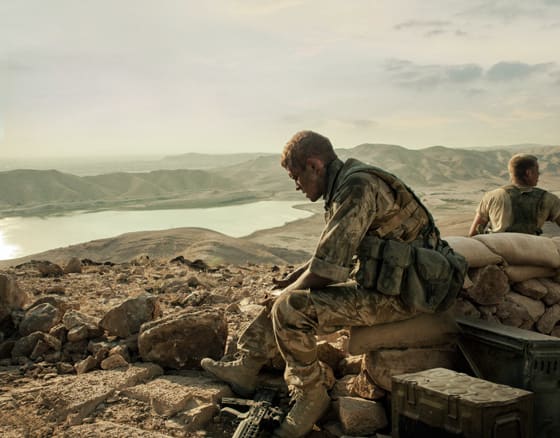There are few military films quite like British filmmaker Paul Katis' gripping feature-length directorial debut, Kilo Two Bravo.
Originally titled Kajaki at home in the UK, the movie tells the remarkable true story of a small group of British soldiers, stationed in rural Afghanistan, who find themselves at the mercy of a forgotten minefield in a dried-out river bed while attempting to investigate a Taliban roadblock.
What seems, initially at least, like a standard set up about good vs. evil quickly transforms into a tale about the true horrors of war, the ones that rear their heads long after the battles are over (the mines, we learn, were planted by the Russians during the Soviet-Afghan war some 20 years before this group of soldiers had even been stationed there).
Then, like some sort of twisted, reverse hangman, the viewer bears witness to one of the most horrific and truly accurate depictions of the carnage of war shown on screen, as limbs are torn like loose feathers as the crew try to navigate their way out of the area.
Those unaccustomed to the British tongue and all its various corruptions may find it hard to understand what's going on at times, but that just goes to show how good Katis is as a director, as he's able to say so much with so little in such an enclosed space (the majority of the film is shot within the same perimeter as most people's apartment floor plans).
Kilo Two Bravo is definitely not for the faint of heart; the film is unrelenting, with incredible arrays of body parts being prepped for future amputations on the fly, and at almost two hours in length, most of the time it feels like there's no end in sight. But to tone it down would be to do the soldiers who went through this hell, not to mention all people affected by war, a gross disservice.
It may not be as flashy, patriotic or mythologizing as other silver screen war stories, but that's what makes Kilo Two Bravo one of the best military dramas yet.
(Search Engine Films)Originally titled Kajaki at home in the UK, the movie tells the remarkable true story of a small group of British soldiers, stationed in rural Afghanistan, who find themselves at the mercy of a forgotten minefield in a dried-out river bed while attempting to investigate a Taliban roadblock.
What seems, initially at least, like a standard set up about good vs. evil quickly transforms into a tale about the true horrors of war, the ones that rear their heads long after the battles are over (the mines, we learn, were planted by the Russians during the Soviet-Afghan war some 20 years before this group of soldiers had even been stationed there).
Then, like some sort of twisted, reverse hangman, the viewer bears witness to one of the most horrific and truly accurate depictions of the carnage of war shown on screen, as limbs are torn like loose feathers as the crew try to navigate their way out of the area.
Those unaccustomed to the British tongue and all its various corruptions may find it hard to understand what's going on at times, but that just goes to show how good Katis is as a director, as he's able to say so much with so little in such an enclosed space (the majority of the film is shot within the same perimeter as most people's apartment floor plans).
Kilo Two Bravo is definitely not for the faint of heart; the film is unrelenting, with incredible arrays of body parts being prepped for future amputations on the fly, and at almost two hours in length, most of the time it feels like there's no end in sight. But to tone it down would be to do the soldiers who went through this hell, not to mention all people affected by war, a gross disservice.
It may not be as flashy, patriotic or mythologizing as other silver screen war stories, but that's what makes Kilo Two Bravo one of the best military dramas yet.
